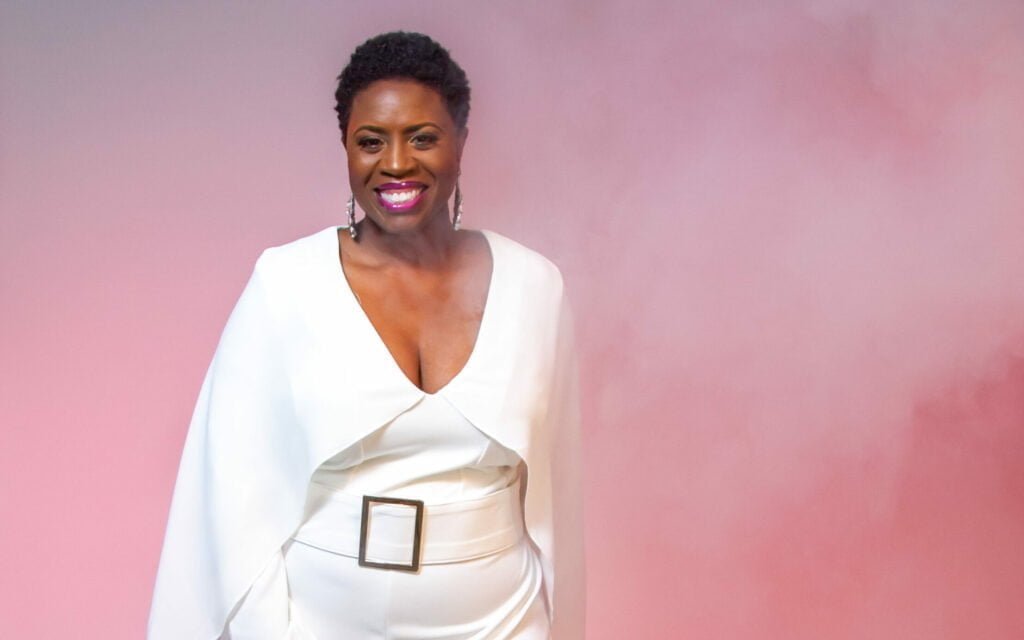Forgiveness: An Honest Conversation with Lynita Mitchell- Blackwell Who Teaches to “Live Life On Fire”

Forgiveness reflects the very core of our humanity. A process that often requires deep introspection, empathy, and, most importantly, honesty, forgiveness has a rich and complex history deeply rooted in human interactions, culture, religion, and philosophy. In the search for a fresh perspective, we reached out to Lynita Mitchell-Blackwell
Despite the evolving landscape where forgiveness has a tendency of becoming extinct, Lynita Mitchell-Blackwell’s latest book ‘Live Life on Fire’ offers renewed hope. She brings to life the age-old wisdom of forgiveness, breathing fresh meanings into this essential human experience. Through her insights and experiences, she invites us to rekindle the power of listening with the flames of self-compassion and empathy, in a world where they are needed more than ever.
Through the pages of Lynita’s latest work, we discover that forgiveness is not just a relic of the past but a lighthouse that can guide us through the complexities of the present and illuminate our path toward a brighter, more harmonious future.

A brief history of Forgiveness
A timeless concept, traceable to ancient civilizations, could be found in the Code of Hammurabi, Mesopotamia. One of the earliest known legal codes (circa 1754 BCE), included provisions for restitution and forgiveness as part of justice. Similarly, ancient Egyptian texts and hieroglyphs often depicted acts of forgiveness, showcasing its significance in these societies.
Many of the world’s major religions have played a significant role in shaping the concept of forgiveness. In Christianity, the teachings of Jesus Christ emphasised the importance of forgiving others as a central tenet of the faith. “Forgive us our trespasses as we forgive those who trespass against us.” This principle has been instrumental in promoting forgiveness within Christian communities.
Buddhism also places a strong emphasis on forgiveness and compassion. The Buddha’s teachings highlight the importance of letting go of anger and resentment as a path to inner peace and enlightenment. The practice of metta (loving-kindness) meditation is one way Buddhists cultivate forgiveness and goodwill towards all beings.
In ancient Greece, there was some idea of gracious kindness towards those who wronged others but forgiveness was explored by philosophers such as Aristotle and Plato. Aristotle viewed forgiveness as a virtuous act that restored harmony to society. Plato considered forgiveness as an essential component of justice and moral development.
Throughout history, forgiveness has evolved from a moral and religious imperative to a recognized psychological and interpersonal process. It continues to be a fundamental aspect of human interaction, offering individuals and societies a path towards healing, reconciliation, and inner peace.
In the 20th century, forgiveness gained attention in the field of psychology. Psychologists like Robert Enright and Everett Worthington developed therapeutic interventions focused on forgiveness as a means to heal emotional wounds and improve mental health. The psychological benefits of forgiveness, including reduced stress and increased well-being, are well-researched.
Discussed in the context of restorative justice, conflict resolution, and reconciliation processes worldwide, secular and non-religious perspectives on forgiveness are emphasising its role in personal growth, empathy, and fostering healthier relationships.
Is Forgiveness a relevant and evolving concept at the beginning of the 21st Century?
Forgiveness remains a timeless and universal concept, one that touches the lives of each and every one of us at some point along the way. Yet, the art of forgiveness seems to have waned in significance. Despite the unfair advantage that technological advancement gives us every day, the world has, in many ways, left little room for the profound act of letting go, of healing, and of embracing reconciliation.
Marked by a quick-click culture, social media outrage, and a seemingly endless cycle of division, forgiveness often feels like an endangered virtue. We’ve grown comfortable to instant judgments, holding onto grudges with unwavering conviction, and allowing the embers of anger to smoulder long after the initial spark.
In ‘Live Life on Fire’ there is a chapter that looks at forgiveness through the lens of the 21st Century: “I Understand It, But I Don’t Agree with It,” which brings a fresh perspective on forgiveness. Let’s explore the author’s insight on forgiveness, and share some thought-provoking quotes from the author. Forgiveness requires an honest conversation as it is a topic that touches everyone’s life at some point, and we hope Lynita’s book can offer guidance and inspiration to ‘Live Life On Fire’.

Lessons from Lynita Mitchell-Blackwell’s latest book ‘Live Life On Fire’
When looking at the complexities of human relationships, forgiveness often stands as the thread that can mend even the deepest wounds. “Forgiveness means releasing the energy that we had regarding a situation, and allowing ourselves the freedom to just be. In allowing ourselves that freedom, it also allows the other person to do the same. But it is not our responsibility to ensure that they can experience that freedom, only that we release them and ourselves to the experience.”
Understanding Forgiveness as the Path to Peace
Understanding comes through communication, and through understanding we find the way to peace.”
Ralph C. Smedley
Understanding is the cornerstone of forgiveness. To forgive, we must first understand, or at least attempt to understand, the perspectives and motivations of others. As Lynbita emphasises, this understanding often begins with open communication. When we engage in honest dialogue, we create an opportunity to empathise with the pain and suffering that others might be experiencing.
“Forgiveness often starts with an open dialogue. It’s about empathising with the other person’s perspective and recognizing that they too may be trapped in their own pain and suffering.
We don’t have to re-enter the situations that caused us pain, but we must release the energy we’ve invested in those grievances. By understanding, we release ourselves and others from the burden of holding onto negative emotions.
What Forgiveness is not
“Forgiveness means releasing the energy that we had regarding a situation, and allowing ourselves the freedom to just be.”
Forgiveness is not about revisiting painful situations but about letting go of the emotional energy we’ve invested in them. By doing so, we free ourselves from the burden of resentment and anger. It’s not our responsibility to ensure that others can experience this freedom; it’s about liberating ourselves to lead happier, more fulfilled lives.
Forgiveness is a Choice
Lynita shares a personal story that demonstrates the importance of choice in forgiveness. While they were stunned, hurt, and angry about a friend’s book, they made a conscious decision not to allocate precious energy to staying upset. They recognized that dwelling on anger would detract from the excitement, hope, and joy they wanted to experience in life.
“I did not want to allocate the energy required to stay upset… I did not want to stay there because in staying there, it would require energy to be transferred from other things in my life that I was very excited and hopeful about.”
Releasing negative emotions is an Intentional Choice
“Forgiveness is about releasing the hold those negative emotions have on us. It doesn’t mean we approve of what happened or that we forget. It means we choose to let go.”
A crucial point Lynita makes is that forgiveness doesn’t equate to agreeing with or condoning the actions of others. Instead, it’s a conscious choice to release negative emotions that have been holding us captive. It’s about focusing on the positive aspects of life, allowing love, peace, and joy to flourish.
“ (…) freeing ourselves to focus on positive aspects of life. It’s like weeding a garden. We remove the things that are inconsistent with love, peace, and joy, just as we’d remove weeds from our garden. Harbouring hurt and anger over something that’s over and done with is a form of foolishness.”
Gaining Perspective Over Time
“It’s an integral part of your growth as a human being and particularly on your path for soul growth and expansion.”
Lynita also touches on the idea that time and perspective can dramatically influence our views on forgiveness. Sometimes, it takes years to gain the courage to see things from multiple viewpoints. This process of gaining perspective is essential for personal growth and soul expansion.
Too much Ego
Lynita’s exploration of forgiveness begins with a unique challenge. An author was writing a self-help book that captured real-life situations and people, opting to use real names and circumstances. Lynita advised caution, suggesting that identities and situations be altered to protect the individuals involved. However, the author was confident in her belief that she had permission, it was followed by a dramatic divergence of opinions that would set the stage for a profound lesson.
“The book did very well, becoming a bestseller. The problem was that some of the same people who said that they were ‘okay’ with being named changed their minds once other people in the community read the book.”
The book soared to great heights, becoming a bestseller. Yet, success came with an unexpected twist. Those who initially agreed to be named in the book grew uncomfortable as their stories were unveiled to the world. The situation spiralled into a disaster, with people vehemently criticising the book and the author facing legal threats. Lynita stepped in to mediate, resulting in the retraction and update of the first edition.
Confronting Painful Truths
“The most interesting moments of the mediation, and some of the comments that slammed the book, came from the realisation that many people were upset because the information was true. They were able to see themselves through their children’s eyes and it was just too painful. The book included interviews with children of blended families. So that meant that their stories included the before period of the divorce, the divorce, the after period of the divorce, as well as the remarrying and creating the new blended families.”
Surprisingly, people were not necessarily upset because the information was false but because it was painfully true. The book included interviews with children revealing the raw emotions of divorce, remarriage, and blended families. Parents were confronted with their past actions and the profound impact on their children, the pain caused by their decisions.
“The parents could not believe some of the things that the children remembered. They were horrified by some of the conversations that were recounted that they had no idea their children had heard or understood, for that matter. They were ashamed and deeply embarrassed by the pain they caused their children, and they saw how they could be perceived as straight monsters by some of the games they were playing with custody and visitation. I had both sympathy and empathy for those parents because when we are in pain, we are not thinking about how other people are perceiving us. All we know is that we are hurting and want the pain to stop – no matter what it takes.“
Lynita eloquently compares the human response to pain to that of a trapped lion. When we’re ensnared in emotional pain, we often become unrecognisable, lashing out at those around us, including loved ones. The pain can distort our behaviour and judgement. We may not even realise the extent of our actions until we gain distance and perspective.
“It is like the lion who gets its paw caught in a trap… when we are caught in the trap of pain, we are going to lose our minds and become like a beast in the jungle.”
Getting to the heart of Forgiveness
“We have to give to get something. Energy is not created nor is it destroyed, it is simply transferred into another state. If we want to get forgiveness we must give space, time, and distance. We must give these things to create the room for the forgiveness we seek. When we do this, we receive the capacity, understanding, and full heart that is open to being forgiven.”
In the journey of forgiveness, Lynita emphasises the importance of giving space, time, and putting a distance between facts and people involved. Forgiveness is not about asking others to move on; it’s about acknowledging our actions, making amends, and giving others the room to heal. This process allows all parties to cultivate understanding and open their hearts to the possibility of forgiveness.
Lynita Mitchell-Blackwell’s insights in “I Understand It, But I Don’t Agree with It” provide a profound perspective on the complex nature of forgiveness. Through her experiences, we learn that forgiveness isn’t always about accepting or condoning actions but about creating the space for healing and understanding. It’s a journey that often requires us to confront uncomfortable truths and give as much as we seek to receive. In the end, forgiveness has the power to mend even the deepest wounds, and it’s a journey well worth embarking upon.
“We want so badly to be forgiven for it. We want people to put it behind them and to forget. But until we own what we have done and what we have said and how we behaved, until we have acknowledged those things to the people that we have hurt (…) the chances of us getting satisfaction are pretty low.”
Forgiveness, as eloquently put by Lynita Mitchell-Blackwell, is a profound act of liberation. It involves releasing the emotional energy we’ve invested in a situation, granting ourselves the precious gift of freedom. Importantly, this liberation extends to the other party involved, although it’s not our responsibility to guarantee their experience of freedom. Our moral duty lies in letting go, freeing both them and ourselves to embark on a journey of healing and growth. In forgiveness, we find the courage to just be, unburdened by the weight of past grievances, and in doing so, we create the potential for profound transformation.
Lynita demonstrates that “Forgiveness Requires Giving, and Sometimes It Is More Than We Want to Give”. Forgiveness is a difficult decision, but ultimately, “I chose forgiveness because I didn’t want to allocate the energy required to stay upset. Every moment spent dwelling on anger and hurt was time taken away from the excitement, hope, and joy I wanted to experience in my life. Life is precious, and I realised that I wanted to spend it in a state of love, peace, and joy. Holding onto past grievances was wasteful and useless in that context.”
Forgiveness, as eloquently put by Lynita Mitchell-Blackwell, is a profound act of liberation. It involves releasing the emotional energy we’ve invested in a situation, granting ourselves the precious gift of freedom. Importantly, this liberation extends to the other party involved, although it’s not our responsibility to guarantee their experience of freedom.
Our duty lies in letting go, freeing both them and ourselves to embark on a journey of healing and growth. In forgiveness, we find the courage to just be, unburdened by the weight of past grievances, and in doing so, we create the potential for profound transformation.
Sometimes, it takes years to have the courage to look back and see things from multiple viewpoints. It’s an integral part of our growth as individuals and our journey towards understanding and forgiveness.
Lynita’s book encourages everyone to explore forgiveness as a way to free themselves from the past and embrace a life filled with love, peace, and joy.
Contact Lynita : https://www.lynitamitchellblackwell.com/contact






